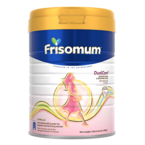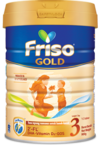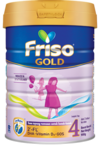Formula Milk Consumption By Age
Which formula milk is the right choice for your child? At what age can.... read more

Diarrhoea can happen suddenly and should be dealt with as soon as possible, especially for young children. Toddlers or younger children might not be able to communicate their illness well, so it falls on you to look out for the symptoms. Your child might be suffering from diarrhoea if they have:
Diarrhoea is usually caused by gastroenteritis, a viral infection of the intestinal lining. Rotavirus gastroenteritis is the most common — as much as 95% of children will experience it at least once by the time they are 5 years old3. At other times, it may be caused by bacterial or parasitic infections. Food allergies or food poisoning (salmonella) may also cause diarrhoea a few hours after ingesting the contaminated food.
Even excess intake of protein can cause diarrhoea. If your child has just one or two loose stools, the cause is probably something unusual your child ate. Lack of proper handwashing before meals is another common cause. Lactose intolerance, in particular, is prevalent for children of East Asian descent4.
Persistent, uncontrolled diarrhoea may lead to dehydration, excessive loss of water and electrolytes — which can cause electrolyte imbalance, mess up the gut microbiota, and circulatory shock. This can lead to fluid imbalance and a compromised immune system, potentially developing into more serious health issues if not addressed quickly. It’s advisable to immediately seek medical treatment to ascertain how severe the case of diarrhoea is, especially if your child is still too young to voice their discomfort.
Always practise good hygiene habits, especially good handwashing techniques. Ensure proper sanitisation of feeding equipment at all times. Be conscious of the correct concentration and quantity of supplementary nutrition you feed your child (e.g. formula milk), and that the amount fed suits the needs and age of your child.
The right nutrition can help increase your child's natural defence against most infections. Friso® Gold contains essential nutrients such as Vitamins B6 and C, Selenium, GOS, Zinc and DHA to help your child grow stronger from the inside, for better resistance on the outside.
Your child might be sensitive to certain ingredients within dairy-based milk formulas, such as lactose from formulas made from cow’s milk. If those cause them to have an upset stomach, check in with your paediatrician for solutions.
While it can be worrying for any parent, children with mild diarrhoea typically recover naturally in a few days. Rehydration is key, so ensure that your child is drinking enough water to replace the lost fluids. If your child is formula-fed, you can continue without diluting it, ensuring they continue with food that they normally have when feeding.
You can also consider including more foods that are high in dietary fibre, such as brown rice or even a small portion of a banana, into your child’s diet while they recover. Foods high in soluble fibre help absorb fluid and can relieve diarrhoea symptoms. Wet poop can also irritate your young child’s skin, so be sure to change diapers more frequently. Continue to manage and observe until they are pooping solid stools less than 3 times a day.
If the diarrhoea symptoms are persistent or acute, it’s time to call your doctor. The following signs indicate a serious condition that requires timely medical attention:
Depending on the condition, your healthcare provider might prescribe antidiarrhoeal medication, antibiotics, or even refer you to a specialist for further therapy. It’s advisable to strictly follow the paediatrician’s prescribed treatment instead of relying on home treatments or cures as a young child may not have developed a strong enough immune system to fight off the bout of acute diarrhoea on their own yet.
In the meantime, it’s important to try to keep your child as comfortable as possible while ensuring they remain sufficiently hydrated and well-fed at all times. One way to achieve this is by preparing a milk formula such as Friso® Gold Step 3 or Friso® Gold Step 4 for your child as this will not only help increase their intake of liquids, but also supplement some of the nutrients lost and increase their natural defences against infections.
Made with milk and processed only once with LocNutri™ Technology to preserve more than 90% of nutrients, Friso® Gold combines the magical goodness of nature with science to bring you easy to digest milk with more than 50 essential nutrients to help your child grow stronger from the inside. Friso® Gold now with NOVAS™ Signature Milk with naturally small molecules and soft structure, has no added sucrose or flavour for easy digestion so your child can be stronger inside. It is incredibly important for your child to have good digestion not only for their comfort but to also avoid complications in their future. Ready to let your child experience the goodness of Friso® Gold? Request a sample today: Try our free 1-day trial pack or get 50% off for 6 days-trial pack!
Reference:
1,2. https://doh.wa.gov/sites/default/files/legacy/Documents/8100//961-158-CSHCN-NI-en-L.pdf (Accessed on March, 2022)
3. Centers for Disease Control and Prevention. Epidemiology and Prevention of Vaccine-Preventable Diseases. Atkinson W, Hamborsky J, McIntyre L, et al, eds. 10th ed. Washington, DC: Public Health Foundation; 2007:295–306.
4. https://medlineplus.gov/genetics/condition/lactose-intolerance/
5. http://www.caringforkids.cps.ca/handouts/dehydration_and_diarrhea


